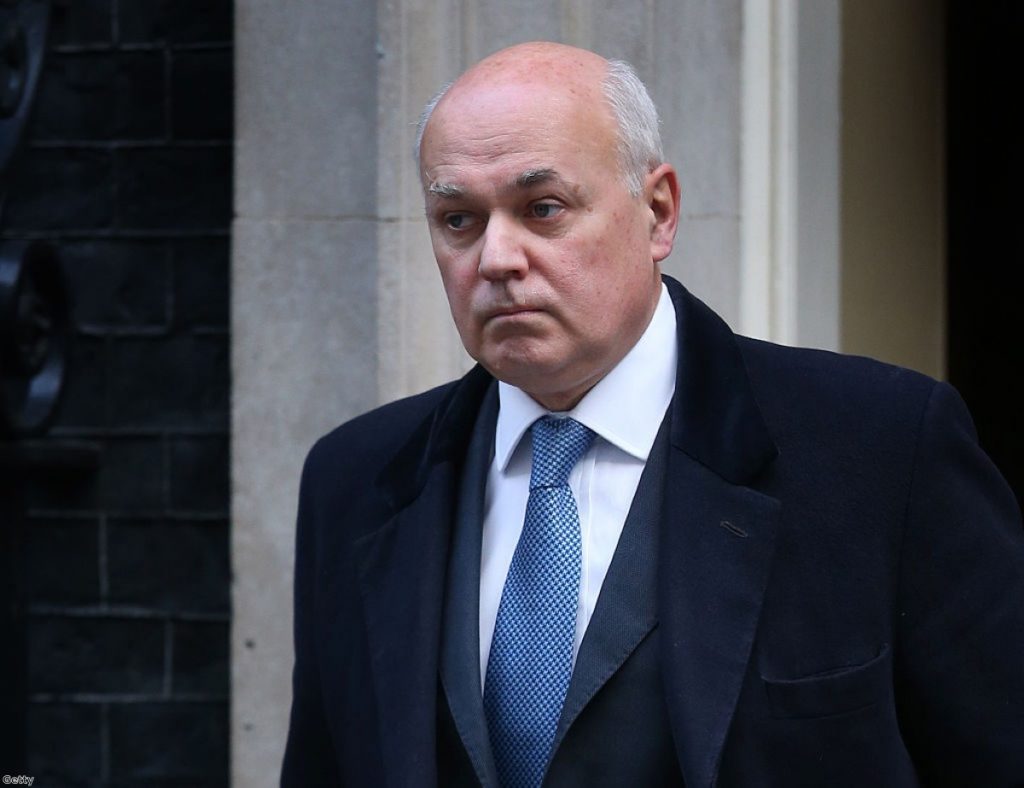Not fit for work: All the times Iain Duncan Smith has got it badly wrong
This week two heavily critical reports were published on Iain Duncan Smith's flagship Universal Credit programme, joining a long list of damning critiques of his time as work and pension secretary. As a result, now seems as good a time as any to take a closer at his record and all the times he has got it badly wrong.

Claim: In 2012 IDS boasted that the roll out of Universal Credit would improve the lives of millions of claimants by "incentivising work and making work pay."
Reality: A report published yesterday by the Institute for Fiscal Studies, says that although the policy would encourage some people into work this was't the case for everyone. In fact some groups, like single parents, will have even less of an incentive to work under Universal Credit than under the old system. Crucially it also suggested the changes would leave working families worse off on average, with their research suggesting 2.1 million families will face an average loss of £1,600 a year.
Claim: In December 2013 IDS insisted the Universal Credit programme would be "essentially" complete by 2017.
Reality: It's unlikely the system will be fully introduced before 2021. And even that isn't clear cut. A report published yesterday by the public accounts committee accused the DWP of blocking parliament from finding out what is causing the delays.

Claim: The Bedroom Tax would help tackle the housing shortage
One of Duncan Smith's key defences of the Bedroom Tax was that it would help free up social housing for those who most need it. The idea being that rather than take a cut in housing benefit for having a spare room, people would move out of their properties and into smaller accommodation, thereby freeing it up for larger families.
Reality: A shortage of smaller properties meant that the overwhelming majority of people affected by the bedroom tax stayed put. A recent government study into the impact of the changes found that 76% of those affected have been forced to cut back on food, with thousands more claimants being driven into taking on payday loans. Only a small fraction of those affected moved into alternative accommodation.
A #domesticviolence survivor has won Court of Appeal challenges over the lawfulness of the #bedroomtax https://t.co/L4iKvcF1nZ
— Refuge (@RefugeCharity) January 28, 2016
Claim: The Bedroom Tax is a fair and reasonable policy.
Reality: Last month, judges ruled that the policy was discriminatory and unlawful in the cases of a domestic violence survivor and the family of disabled teenager. The ruling has strengthened calls by Labour and campaigners for the policy to be scrapped.
Letters to Guardian on #WCA and #ATOS http://t.co/GTVnQQCjM3 #ESA #dpac #end WCA now
— DPAC (@Dis_PPL_Protest) March 3, 2014
Claim: Face-to-face assessments of disability benefit claimants would mean payments would only go to those who most need them
Reality: Many people with serious disabilities and even life-threatening conditions have been judged as fit-for-work under the Work Capability Assessment (WCA) scheme. In 2013 Linda Wootton died in hospital just nine days after the government stopped her benefits and ordered her to go back to work. Amid growing criticism of the assessments, in March 2014, it was confirmed that ATOS, the private company contracted to carry out the assessments, were to end their contract with the government a year early.

Claim: Personal Independence Payments would "better reflect today's understanding of disability" than the Disability Living Allowance (DLA)
Reality: The switchover from DLA to PIP was a disaster with thousands of people waiting months for their applications to be assessed. This was made even worse by the introduction of a new step in the appeals process. The Mandatory Reconsideration stage resulted in many of those who had already waited long periods for a decision to be made being left waiting even longer to have the opportunity to challenge it.

Claim: Cutting benefits of the sick and disabled would spur more people into work. The DWP proposed to slash Employment Support Allowance (ESA) by £30 per week.
Reality: The plan was defeated in the House of Lords last month, with opposition peers coming together to argue that the plans could result in making it harder for claimants to find work. However, IDS still remains committed to it, with the prime minister personally defending cuts which will affect cancer sufferers, during prime minister's questions yesterday.
Significant victory for carers Government to exempt all carers in receipt of Carer’s Allowance from the benefit cap! pic.twitter.com/Islx0PEqgZ
— CitizensAdviceHalton (@haltoncab) January 26, 2016
Claim: Last year the government defended IDS' benefit cap in a legal case brought by two carers who were affected by the policy. Lawyers acting on behalf of the secretary of state argued that unpaid carers should be treated as unemployed people who should make the same decisions as anyone else about living costs.
Reality: The judge ruled that the policy unlawfully discriminated against disabled people and was forcing people to give up their caring role so they could find work. The government has now backtracked and will not impose the benefit cap on full time carers.
The list could go on. There have been almost endless criticism and concerns raised over the DWP's use of sanctions and the link between IDS' reforms and a surge in the use of food banks across the UK.
The government has often argued that the old welfare system wasn't fit for purpose. After looking at his recent record, perhaps the same could be said for the work and pensions minister.





-01.png)